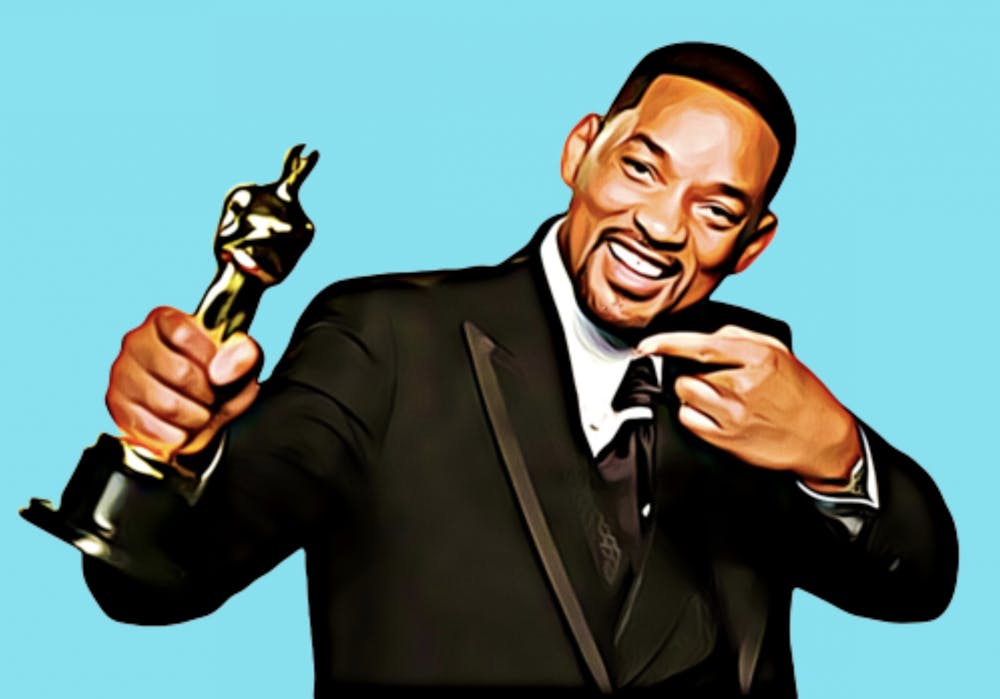After several years of declining viewership and fervent criticism, the Academy made a variety of attempts to bring back viewers and spice up its programming. However, these best-laid plans were thwarted by unexpected drama and an otherwise bland broadcast.
Hollywood’s biggest and brightest gathered in the Dolby Theater, completely free of masks and social distancing Sunday. This year, the program was meant to run for three hours only, in hopes of bouncing back from last year’s record-low viewership. In the past, the program has lasted up to four hours and twenty minutes.
In order to save time, eight categories were announced while most guests were still on the red carpet, then edited back into the broadcast — many of these awards were in the technical categories and were taken home by “Dune,” including best original score, visual effects and cinematography. Despite this change, the broadcast still managed to run three hours and forty minutes.
The live show began with an electrifying performance from Beyoncé of “Be Alive,” the original song she wrote and recorded for the Best Picture-nominated “King Richard.” Sporting a bright yellow costume and performing on one of California’s tennis courts, the star paid homage to the Williams family that the film is based on.
In traditional Oscars style, hosts Amy Schumer, Wanda Sykes and Regina Hall used their opening routine to shed light on Hollywood’s biggest controversie , tackling topics like toxic masculinity and sexism in the entertainment industry.
“This year, the academy hired three women to host because it’s cheaper than hiring one man,” Schumer joked.
The ladies also took jabs at some of the nominees.
“[Leonardo DiCaprio] has done so much to fight climate change, and leave behind a cleaner, greener planet for his girlfriends,” said Schumer about the 47-year-old actor. Many of the jokes were laughed off by their subjects, as is usually the case with award shows.
In several desperate attempts to evoke nostalgia among viewers, the show’s presenters revisited some of Hollywood's biggest hits. Actors Woody Harrelson, Wesley Snipes and Rosie Perez hit the stage to honor the 30th anniversary of sports comedy film “White Men Can’t Jump,” and a dramatic montage honored 60 years of the James Bond franchise. While these segments may have piqued viewers’ interest for a couple of seconds, they ultimately did little to draw sustained attention to the broadcast.
Despite the show’s obvious attempts to please fans, this year’s Oscars had some positives, including several wins for representation in Hollywood. Arianna DeBose became the first openly queer woman of color to win an Oscar after taking home the award for Best Actress in a Supporting Role.
“To anybody who has ever questioned your identity, or you find yourself living in the gray spaces, I promise you this. There is indeed a place for us,” DeBose said in a moving acceptance speech.
Troy Kotsur also made history as the first deaf man to win an Oscar, taking home the award for best actor in a supporting role for his work in “Coda.” Katsur delivered his speech in American Sign Language and was met with uproarious applause, both audible and silent. The same film also took home the coveted Best Picture Award at the end of the night, ending the broadcast on a triumphant note.
To many fans’ delight, the beloved Pixar feature “Encanto” snagged the award for best animated feature, and was also celebrated with a vibrant performance of the movie’s hit song “We Don’t Talk About Bruno.”
For her work on “The Power of the Dog,” Jane Campion — the only female director nominated — took home the award for achievement in directing. These wins follow a years-long wave of criticism of the lack of diversity among Oscar nominees and winners, including the famous #OscarsSoWhite discussion on Twitter.
Despite the moving wins, the award show was often derailed by the Academy’s obvious and heavy-handed attempts at increasing viewership. In recent years, viewers have pointed out the discrepancy between Oscar nominees and box-office hits — since “Lord of the Rings: The Return of the King” won best picture in 2004, not a single best picture nominee has been in the box office revenue top ten. Many criticize the lack of inclusion of more commercially popular movies in the Academy’s nominations, citing it as a reason for declining interest.
In response, the Academy introduced two new fan-driven awards — the Oscars Fan Favorite, won by Netflix’s “Army of the Dead,” and the Oscars Cheer Moment, given to the moment when the Flash enters the Speed Force in “Zack Snyder’s Justice League.” Despite its good intentions, these moves from the Academy only come across as pandering and desperate.
As more categories were announced and more old movies were highlighted, the show hit a lull — until it was time for Chris Rock to present the award for best documentary feature. In the most talked-about moment of the night, Best Lead Actor nominee Will Smith slapped Rock after he cracked a joke about Smith’s wife.
Rock jokingly suggested that Jada Pinkett Smith will appear in the sequel to “G.I. Jane,” a movie starring a bald woman. Jada is also bald, and has spoken openly about her struggle with alopecia — a condition that causes hair loss.
At first, Will Smith appeared to laugh at the joke. Seconds later, though, Smith walked onstage and struck Rock. “Keep my wife’s name out of your f—king mouth,” Smith said as the audio cut out of the live broadcast.
The moment blew up on social media as a frenzy of debate over whether Smith was justified in his confrontation followed. Many celebrities weighed in on the subject — some said Smith’s actions were justified and praised him for defending his wife, while others condemned his use of violence, especially in front of such a vast audience.
Smith later won the Oscar for best lead actor — the first Academy Award of his career — making vague references to the conflict in his acceptance speech.
“I know to be able to do what we do, you’ve got to be able to have people talk crazy about you,” Smith said. “In this business, you’ve got to be able to have people disrespecting you.”
The day after the ceremony, Smith released an apology via Instagram. Calling his actions “unacceptable and inexcusable,” the star took the opportunity to address Chris Rock himself — something he neglected to do in his acceptance speech.
“I would like to publicly apologize to you, Chris,” Smith said. “I was out of line and I was wrong.”
Unfortunately, even a novel event like Will Smith’s slap could not help the Oscars generate the ratings of its heyday. Although the awards show managed to increase its ratings from last year, the 2022 Academy Awards were still the second least-viewed in recorded history.
It is obvious why Smith and Rock’s interaction has dominated most of the post-show conversation — outside of the controversy, there was not much else to discuss. When the Smith controversy is taken out of the equation, the Oscars felt frustratingly similar to any award show of the recent past — its formulaic montages, speeches and performances have become indistinguishable from year to year.
While the Oscars offered a handful of monumental wins and shocking moments — well, moment — this year’s show hardly saw a deviation from its usual dryness. Once again, the Oscars revealed just how hard the Academy is struggling to find a balance between preserving the fine art of cinema and appealing to the masses. Viewers’ fixation on Will Smith’s slap reveals that what viewers really want is something memorable, something unexpected — a desire that will not be satisfied by shortening the programs or adding a couple of “people’s choice'' categories. If the Academy wants to regain the viewership and acclaim it once had, more substantial, long-term changes may be necessary.





